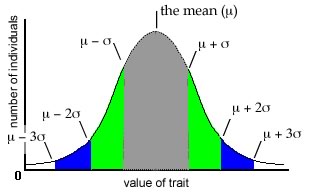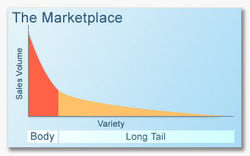The Long Tail and Some Businesses I Don't Understand

Chris Anderson's book "The Long Tail: Why The Future of Business Is Selling More of Less" highlights a statistical phenomenon of the modern business environment brought about by the revolution in information technology: The much increased efficiency in bringing together suppliers and buyers of goods and services means that sellers of very niche products can now reach out to buyers of such products in the furthest corners of the world. The term "Long Tail" is derived from the shape of the bell-curve representing a Gaussian [Normal] statistical distribution, where the greatest frequencies occurs at the top of the curve. [see images above] The Long Tail means a greater number of frequencies at the extremes, or "more of less" as the book title says.
The Long Tail is the reason why I can indulge in my very niche interests. I can buy books on esoteric subjects like Evolutionary Programming, stochastic modeling or mathematics in Nature from Amazon. I can also buy jazz CDs which don't appear in the catalogue of big stores, Jazz guitarists like the late Howard Roberts, the still-living but reclusive Ed Bickert of Canada, or Anthony Wilson, the guitarist of Diana Krall. On the Internet I can subscribe to esoteric forums like TDPRI[www.tdpri.com] for fanatics of the Fender Telecaster;rec.music.makers.guitars.jazz the newsgroup for jazz guitarists and comp.soft.sys.matlab for users of Matlab. On TV, I can tune in to channels that show nothing but programs on the Military on Food, or Comedy. Though these are not that esoteric, there are also TV channels airing programs solely on weddings, court cases, DIY house improvement, boxing, plastic surgery, antiques, etc.
The fact is that, information technology has made catering to very niche needs economically viable, by increasing the scale of the business. You may not be able to find enough people who are interested in your book on African butterflies in Australia. But when through the Internet and your web site you can reach out to the whole world, then your book may sell in sufficient quantity to justify publishing. Katz the famous New York delicatessen found that sales of their famous Bologna tripled when they had a web site which attracted buyers from all over the world. In the same way, suppliers of live Maine lobsters now ship them all over the world to individuals who bought online from their web site.
What this means for the individual is that there is opportunity for you to develop your talent, any talent that differentiates you from the rest of the pack, and make a business out of selling it. Thus being an entrepreneur and working from home becomes much more of a possibility. Here are some examples of niche businesses and people who turned what they did best into a business. The business need not be Internet-based. It can be a brick-and-mortar business but using the power of the Internet to let people know about your business:
1. A New Jersey Company is in the business of banana ripening. It seems that there is a demand for such a facility since bananas are usually harvested when still green, and shipped to their markets unripe. In fact banana ripening is a whole industry, with an association and a newsletter too ['The Ripener']. There are special rooms with the required temperature and humidity for banana ripening.
2. There are Companies in the USA who have services that bail you out of jail for offences like drunk driving, failure to pay your alimony or driving under a suspended licence. These Companies are open 24 hours a day, every day, so that offenders can reach them when they need them most. [which is usually late at night or the wee hours of the morning]
3. A lady in Florida rents out Doves and Rabbits for weddings. She has a web site and the customers come from all corners of Florida from the Panhandle to Miami. Her husband has a shop that sells only swords: Samurai swords, Indonesian kris, Nepalese Gurkha kukris.
4. I often see advertisements in Craigslist offering companionship services for lonely people, usually old widows who live alone. All the 'seller' of this service has to do is go over, play gin rummy, talk about her budgerigars or look at photos of her grandchildren in Minnesota. There are also ads from people who want to walk your dog or run errands and queue up for you whether to pay a traffic fine or to buy tickets for a movie.
5. Every business seems to want to outsource a lot of their activities now. So there are people to whom you can outsource your accounting, your human resources and administration, your IT network security etc. Many books are 'outsourced'. i.e. The author just uses his brand-name recognition [if he is someone of note] and looks for a ghost writer to write his book.
But putting the Long Tail aside, there are some businesses I don't understand because their business model seems to make no sense, or the economics of their products are inherently disadvantageous:
Businesses I Don’t Understand
The Christmas Shop is a shop in downtown Melbourne, Florida that sells nothing but goods related to Christmas. Christmas tree decorations and fake holly wreaths, inflatable Santa Clauses and chocolates in Christmas wrappings, books and music on Christmas etc. Nothing unusual except that this store is open all year round, and does not display any non-Christmas related products. I have never seen anybody going into the store when it’s earlier than November. So how does it survive and why is the owner always there every day of the year and smiling?
Shops that sell heavy gym equipment and machines, free weights, barbells and dumbells that are imported from another country. These are items that are very heavy in weight relative to their value and yet the final price of these exercise equipment is not very high. The freight costs must be formidable, and yet we find Companies doing the sale and installation of gym equipment. Perhaps they make their money from maintenance of the equipment and machines.
Bottled water sells for about US$1.00 each. But buy a 24-pack and you pay only about $5.00. Which means each bottle now costs $0.20. How is this fantastic reduction possible? Besides being Perrier, Evian or some branded water which can sell for 5 times more per bottle, how does the economics of water work? It is a low-value product which must be transported from the source, which is usually far away from the city if it is natural spring water, to the market. The further away the market, the more costly the transportation cost. So how is water from Maine able to sell in Florida for about the same price as in Maine? If it is distilled water, and not natural spring water, then it can be produced by distilling water from the tap and bottled near the selling point. Or perhaps the spring water is carried in tankers to a bottling point that is closer to the selling point.
Big groups of musicians performing as a band. The economics of music is such that the marginal value of a band decreases with each additional member, and this decrease is at an increasing rate, the higher the number of members. A two-man band may be much better than a solo musician in terms of adding to the listener and entertainment value, a 3-man band is better still but not by as much. A 4-man band begins is beginning to sound expensive to the person hiring it, with a 3-man band being not much lesser in listener and entertainment . A 10-man band better have a very good reason for being hired. Even if the solo singer gets more than the accompanying orchestra, e.g. Brian Seltzer and his Swing Orchestra, the whole group still costs a lot of money and the potential hirer is tempted to look for smaller bands which are near equivalents. The economics of bands is indeed strange and could be the subject of a Ph. D thesis.
Exotic car dealerships. I wonder how a dealer for an exotic car like a Pagani Zonda makes his business viable. He may sell only one Zonda a year [albeit for a million dollars]. Even if there is demand for more Zondas, the output from the factory is limited and he may only have a quota. But he has to maintain a full workshop and technical support staff to sell that Zonda. Unless he has several exotic car dealerships under the same Company and sharing the same infrastructure. Or his dealership extends over a geographical area covering several countries.
TV wild life documentaries: If you are a photographer and spent three years in the Okavango Delta filming the life of a Leopard family, what would be your expenditure during those three years and how much would you need to be compensated for it? It’s a full-time thing and you can’t leave the project to do other things during the three years or you would lose track of developments in the Leopard family. But how much can National Geographic or Discovery Channel pay year for that documentary that took three years to produce? If they paid your three years of expenditure, would the screening of this documentary yield revenue that would be three times as much as a similar documentary on leopards which took one year to produce?




Comments
Post a Comment